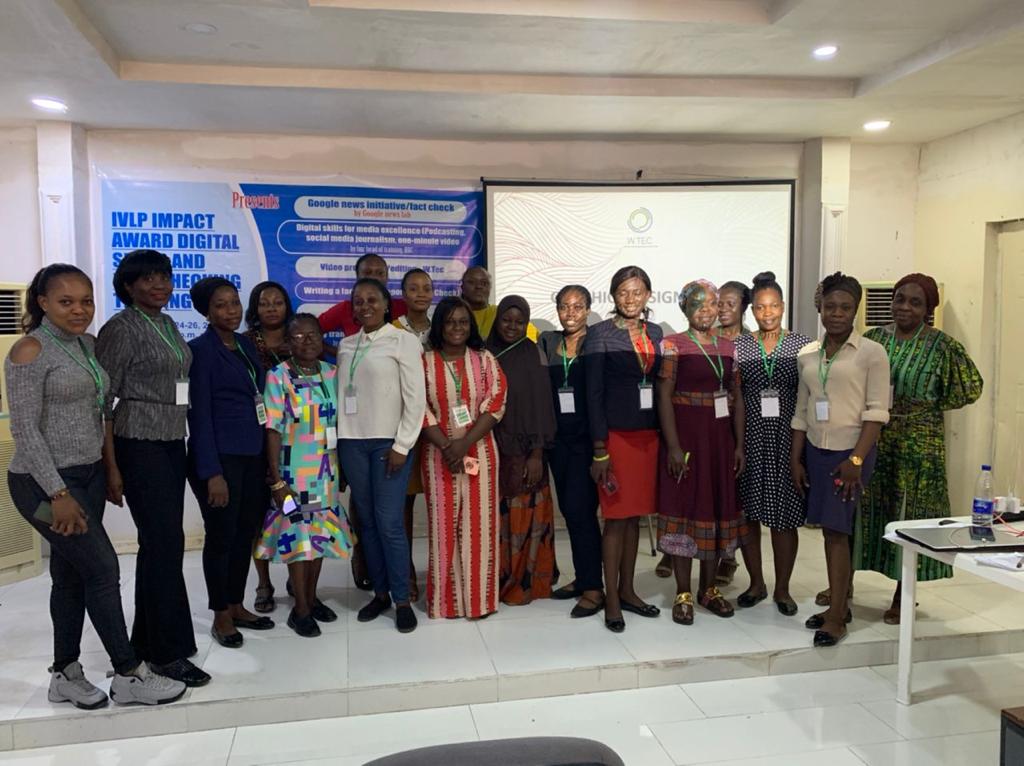The evolution of technology and digital advancement has no doubt enhanced productivity, global engagement, as well as connectivity in several professions and enterprises. Today, Journalism practice has evolved and it’s no longer enough for journalists to know how to write and report news stories.
With technological advancement changing the way journalism is being practiced, it has become expedient for journalists and media professionals to be digitally enabled in other to effectively discharge their duties and thrive in the 21st-century media setting.
To bridge the digital gap in journalism practice, International Visitor Leadership Programme (IVLP) alumna and Commissioning Editor Nigeria, The Conversation Africa, Kofoworola Belo-Osagie has trained 21 female journalists on digital and fact-checking skills, courtesy of the IVLP Impact Award Project.
The three days training was held on August 26 -28, at the Centre for International Advanced and Professional Studies (CIAPS) in Ikeja, Lagos, Nigeria.
Belo-Osagie, in her welcome address, said that the training was targeted at female journalists selected across various media organizations in Nigeria with the aim to help them master digital and fact-checking skills to check information and disinformation.
“Journalism now needs digital skills. Non-professionals beat us to it resulting in the rise of media users untrained in journalism ethics doing a lot of damage in the information space.
“By gaining specialised skills that help bridge the digital gap, the journalists will expand the army of professionals in the media space. They will also better fight fake news and produce much-needed quality content that supports societal development” she said.
Explaining why the training was targeted at women in the Nigeria media, Belo-Osagie said that the decision was informed by the need for women to move fast with the technological advancement that is rapidly changing the way journalism is being practiced and also because of the discrimination faced by women in the media.
“In many media houses in Nigeria, few women occupy positions in senior management,” she said.
Addressing participants, Mrs. Motunrayo Alaka, Executive Director, Wole Soyinka Centre for Investigative Journalism, urged female journalists to be intentional in taking up leadership roles, participate actively in the digital space, as well as extend their media practice to the digital media.
She encouraged them not to be intimidated by the technicalities of the digital media, but rather, they should learn algorithms, understand how things work, and yet be professionals.
The training focused on digital skills for media excellence, mobile journalism, and fact-checking, was facilitated by experts from media and digital organizations.
Kenneth Kiunga, Google News Lab Teaching Fellow, and Kenyan-based journalist trained the participants on fact-checking information using google tools and search engines.
According to the Google News Lab facilitator, “while you are a journalist, owning your skill as a researcher makes you a better journalist and a good fact-checker”.
Usifor Cyril Omozokpea, Digital Journalist and Multimedia Producer, trained participants to reach more comprehensive and targeted audiences on digital media using social media journalism.
Usifor further exposed the participants to creative ways of communicating messages to audiences on digital platforms. The Social media strategist shared important tips and digital tools that journalists can employ to make their work easier and smarter.
He debunked the notion that “there is no money in journalism”, noting that there are money-making ventures journalists can engage in to earn more legitimately, and shared some of these ventures with the participants.
“Don’t let anybody tell you that you can’t live well because you are in the media or because you are a journalist,” he said.
Oluseyi Awojulugbe, a researcher at Africa Check facilitated a fact-checking session on indices for identifying fake news and how to write a fact-check report.
Awojulugbe emphasized on the need for journalists to be critical thinkers and accurate in their reporting.
In furtherance to equipping the female journalists with digital skills that will enable them to translate stories in a more creative way due to the dynamism in journalism practice, the Women’s Technology Empowerment Centre represented by their experts Ayomide Omoniyi, and Lesley Tarabina, facilitated a workshop on graphics design, video production and editing. Participants were exposed to simple graphics and video editing techniques using mobile phones.
Titilope Fadare, a multimedia journalist, shared the concept of mobile journalism with the participants, and how to produce videos for news reporting.
At the end of the training, participants commended the efforts of the organizer, Belo-Osagie for an impactful training and warm reception.
Reiterating that the digital skills and fact-checking training was courtesy of the IVLP Impact Award, Belo-Osagie encouraged the participants to be deliberate in sourcing and applying for fellowships.
She also encouraged the women to embrace training opportunities and self-development to amplify what they have learnt and also advance in their careers.

